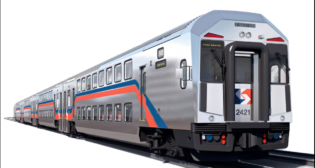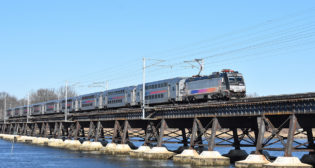
Wabtec Strikes DGNB Gold in Germany
Written by William C. Vantuono, Editor-in-Chief
Wabtec Bochum. Illustration Copyright Panattoni.
Wabtec Corp. has struck gold in Germany—DGNB (Deutsche Gesellschaft für Nachhaltiges Bauen, or “German Sustainable Building Council”) Gold, that is. The U.S.-based global railway supplier has broken ground in Bochum on a 20,000-square-meter facility for developing, manufacturing and/or maintaining transit vehicle brakes and couplers. Described as “green and state-of-the-art,” the plant will be DGNB Gold-certified “in recognition of its sustainable and innovative design” when completed in third-quarter 2020.
The nearly 34,000-square-meter site will have a production area of 9,200 square meters, a storage area of 5,100 square meters and 5,600 square meters of office space at Sophie-Opel-Straße 5, 44894 Bochum.
Bochum is the sixth largest city in western Germany’s North Rhine-Westphalia region, after Cologne, Düsseldorf, Dortmund, Essen and Duisburg. Investor and project developer Panattoni Europe is building the facility. Wabtec’s site will include a sustainable roof on the administration building, make use of geothermal heating, intelligent light control and photovoltaics, and offer charging stations for electric automobiles and bicycles, thus reducing its ecological footprint. It will be part of MARK 51°7, described as “a knowledge center for industry and technology” redevelopment company Bochum Perspektive 2022 GmbH is establishing at the former location of an Opel Automobile GmbH administration building.


“This new building represents a major investment into Wabtec’s capabilities and expertise to deliver green, business-critical products and services for our customers,” said Wabtec Transit President Lilian Leroux. “It will be an environmentally friendly facility focused on producing a variety of transit braking solutions, including segmented and conventional disc applications and brake control systems for customers around the world.”

“We are excited to break ground on this new facility and leverage our deep history in Germany to bring breakthrough technologies to the industries we serve,” said Wabtec Transit Brakes & Safety President Dr. Christopher Antes. “This new facility will provide the space we need to deliver the highest standards of productivity and quality, as well as a future-oriented working environment for our employees. It also is centrally located near Bochum’s universities and rich engineering talent pool.”

The 1,200-member DGNB is a German non-profit organization described as “Europe’s biggest network for sustainable building … reflecting the interests of the entire building and property industry value chain … architects, engineers, construction planners and consultants, project managers, development managers, investors, building contractors and providers of building services.”

Editor’s Note: Like Wabtec’s home city of Wilmerding, Pa. (near Pittsburgh), Bochum has a history of coal mining and steel production. Established in the 9th century by Charlemagne, Bochum was almost totally destroyed in World War II by Allied bombing, as it was a manufacturing center for war munitions. The U.S. Army ground advance into Germany reached Bochum in April 1945. The 79th Infantry Division captured the city on April 10 of that year. Interestingly, during World II, Wabtec antecedent Westinghouse Air Brake Company, like many U.S. industries, was converted to manufacture munitions. Women in the company’s Department U assembled bomb fuses. It’s likely that bombs equipped with those fuses helped destroy German bombs manufactured in Bochum. Seventy-five years later, U.S. and German interests have united to support rail transit by developing and manufacturing vehicle components in a “green” building. That’s real sustainability. — William C. Vantuono




